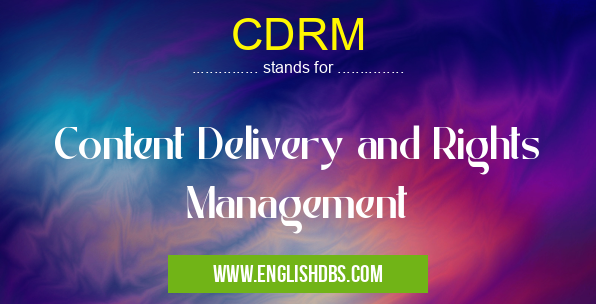What does CDRM mean in MANAGEMENT
CDRM stands for Content Delivery and Rights Management.

CDRM meaning in Management in Business
CDRM mostly used in an acronym Management in Category Business that means Content Delivery and Rights Management
Shorthand: CDRM,
Full Form: Content Delivery and Rights Management
For more information of "Content Delivery and Rights Management", see the section below.
» Business » Management
Full Form of CDRM
Meaning of CDRM in Business
CDRM refers to a comprehensive system that enables the secure delivery of digital content to users while enforcing specific rights and restrictions. It involves technologies and processes to protect intellectual property, manage licensing, track usage, and prevent unauthorized distribution.
Key Components of CDRM
- Content Delivery: Distributing digital content to authorized users through various platforms and channels.
- Rights Management: Establishing and enforcing specific rules for content access, such as expiration dates, usage limits, and copyright protection.
- Identity Management: Verifying the identity of users to ensure they have the necessary permissions to access protected content.
- Encryption: Securing content during transmission and storage to prevent unauthorized access.
- Watermarking: Inserting invisible marks into digital content to track its usage and identify its origin.
- Usage Tracking: Monitoring the consumption and distribution of protected content to enforce licensing agreements.
Benefits of CDRM
- Protection of Intellectual Property: Safeguards valuable digital assets from piracy and unauthorized use.
- Revenue Generation: Enables rights holders to monetize their content by controlling access and enforcing licensing terms.
- Improved Content Distribution: Streamlines the delivery of digital content to a wide range of devices and platforms.
- User Convenience: Provides users with seamless access to authorized content while adhering to usage restrictions.
Essential Questions and Answers on Content Delivery and Rights Management in "BUSINESS»MANAGEMENT"
What is CDRM?
Content Delivery and Rights Management (CDRM) is a set of technologies and protocols that protect and manage digital content. It ensures that only authorized users can access and use the content, and that it is not copied or distributed illegally.
How does CDRM work?
CDRM uses a combination of encryption, digital signatures, and license management systems to protect content. The content is encrypted so that it cannot be accessed without the correct decryption key. Digital signatures verify the authenticity of the content and ensure that it has not been tampered with. License management systems control who can access the content and how it can be used.
What are the benefits of using CDRM?
CDRM offers a number of benefits, including:
- Protection of intellectual property: CDRM helps to protect copyrighted content from piracy and unauthorized distribution.
- Control over content usage: CDRM allows content owners to control how their content is used, such as limiting the number of times it can be viewed or copied.
- Improved user experience: CDRM can make it easier for users to access and use digital content, as they do not have to worry about piracy or unauthorized distribution.
What are some examples of CDRM technologies?
Some common examples of CDRM technologies include:
- Digital Rights Management (DRM): DRM is a set of technologies that protect digital content from unauthorized access, copying, and distribution.
- Content Protection System (CPS): CPS is a system that is used to protect digital content from piracy.
- Secure Digital Media Initiative (SDMI): SDMI is an industry initiative that aims to develop a set of standards for protecting digital content.
Final Words: CDRM plays a crucial role in the digital content industry by protecting intellectual property, managing rights, and ensuring secure content distribution. It empowers businesses to monetize their digital assets effectively, while providing users with convenient access to protected content.
